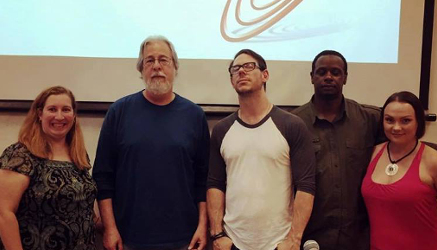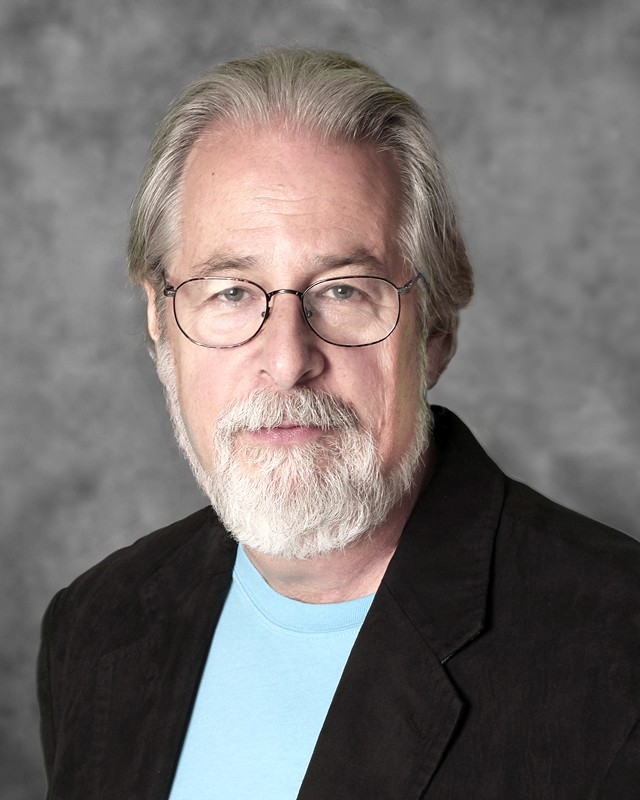In the spirit of David Letterman, whose show broadcast its final installment in the wee hours of this morning, the top 10 things we learned from music publisher, attorney and author Steve Winogradsky at NARIP’s program last night in Atlanta include:
Photo (L-R): NARIP Board Member and moderator Julie K. Roach, Esq., guest speaker Steve Winogradsky, Esq., NARIP Board members Sean Mcpherson, Rich Rolyn and Lee Morin, Esq. at Overview of Songwriter, Publishing and Co-Publishing Deals in Atlanta.
In the spirit of David Letterman, whose show broadcast its final installment in the wee hours of this morning, the top 10 things we learned from music publisher, attorney and author Steve Winogradsky at NARIP’s program last night in Atlanta include:
1. Keep your contact information current with your performing rights organization (PRO). This means updating your address, phone number, and emails with ASCAP, BMI, or SESAC every time it changes. If your PRO
does not know how to reach you, your royalties won’t reach you either!
2. There are three kinds of songwriter deals between publishers and song writers: 1. co-publishing, where the author earns both the writer’s share (50%) and part of the publishing royalties (25%); 2. self-publishing, where the author earns all of the writer’s share (50%) and all of the publishing royalties (50%); and, traditional publishing, where the author earns the writer’s share (50%), and cedes all of the publishing royalties to the publisher (50%).

3. MFN = Most Favored Nations. This term is borrowed from the World Trade Organization and means every nation will be treated equally and without prejudice. This “term of art” has been adapted for use in the music business to create parity and means that if any other music of similar status on a project is licensed at a higher price than you were originally quoted, the licensee or production company is obligated to pay you the same amount for your song or cue that it paid for other similar song(s) or cue(s). It does not mean that a new artist or band will command the same license fees as a song written and / or recorded by The Beatles. It simply means that artists of similar stature will be treated equally. This is important language to have in every music license.
4. Know how to read your contract with a publisher. As a songwriter, you represent and warrant that your works of authorship are original. If you copy someone else’s work, whether intentionally or not, you still agree to hold the publisher harmless when you indemnify him for all claims or losses resulting from a breach of your promise. Be authentic!
5. Sampling can be dangerous. It is never lawful to copy someone else’s work, no matter how small, into your own, without permission granted in a license from the owner of the sampled work. It is recommended instead to create and record your own sounds. Again, be authentic!
6. If you are a songwriter, use a split sheet. It is always easier to remember who contributed or wrote what part of a song when you record details of the split contemporaneously. Do not wait until much time passes and you are in the middle of an embroiled legal battle over royalties. Steve says the best time to sign a split sheet is right after the music has been written and before anyone leaves the studio.
7. Bands can implement three kinds of royalty structures: 1. Only select members earn the writer’s share and the publishing rights (The Who or The Beatles models); 2. All members split the writer’s share and publishing royalties equally; or 3. Only the writers earn the writer’s share, and band members split publishing royalties equally as members of a self-publishing company.

8. If you transfer ownership of your copyright in your work to a publisher in an Assignment Agreement on or after January 1, 1978, then you are empowered under 17 U.S.C. Section 203 to terminate that transfer so long as you meet the specified term and notice requirements contained in the statute.
9. If you want your descendants to continue to receive the benefit of your royalty streams long after you die (remember, copyright lasts for the life of the author, plus 70 years!), then record your intent in a will while you are alive, specifying to whom ownership of your copyrights will descend, and to whom your royalties will be distributed. If your rights to termination are not yet ripe, then keep in mind you need a simple majority among owners to effect termination. If your heirs disagree, you may consider only bequeathing ownership to one, who will carry out termination.
And the top thing we learned last night (and this is IMPORTANT!):
10. Says Steve, if you see a music attorney wearing a tie, then he is not a real music attorney, but a divorce lawyer whose nephew plays the bass. Make sure you hire a music attorney who understands the nuances of the music business! We use language in ways other attorneys do not; therefore, it is imperative that you hire competent counsel to represent you!!!!
Miss this NARIP program? No problem! To purchase the audio click HERE NOW
Written by Lee Morin, Esq. for NARIP.com.
About The Author

Lee Morin, Esq., MORIN Entertainment Law
Lee Morin, Esq., is Principal Attorney and founder of MORIN Entertainment Law, a boutique law firm in metro Atlanta that specializes in serving artists and entrepreneurs in creative industries including music business, fine art, game design, book publishing, theatre, film, television, and fashion design. Lee Morin has over ten years of experience in legal services, both in the corporate law departments of global companies and national to regional law firms. She counsels and represents her clients to provide each with the means to harness the power of enterprise. Lee leverages her networks to the advantage of her clients. She is an active member of the Entertainment and Sports, Intellectual Property, and International Law sections of the Georgia Bar, Georgia Game Developers Association (GGDA), International Game Developers Association (IGDA), National Association of Record Industry Professionals (NARIP), Georgia Lawyers for the Arts (GLA), Georgia Music Partners (GMP), Georgia Production Partnership (GPP) and the Recording Academy® (NARAS).
About Steve Winogradsky, Esq.

Steve Winogradsky, Esq., Winogradsky Sobel
Mr. Winogradsky is the author of the book “Music Publishing: The Complete Guide” (2013), can be purchased HERE. The book is highly recommended by NARIP.
With over thirty years experience as an attorney in the music industry, Steven Winogradsky is a partner in Winogradsky/Sobel in Studio City, California, providing global media and music business affairs & legal support for composers, songwriters, music publishers, recording artists and television, film, video and multi-media producers. In addition to an entertainment law practice, the company handles music clearance and licensing in all media for many production companies, worldwide administration of the publishing catalogs for a number of clients and New Media strategies and Revenue Modeling.
Prior to being in solo practice with The Winogradsky Company from 1992 to 2009, Mr. Winogradsky had served as Director of Music Business Affairs for Hanna-Barbera Productions, Inc., Managing Director of Music, Legal & Business Affairs for MCA Home Entertainment, Director of Music Licensing and Administration for Universal Pictures and Universal Television and Vice President of Business Affairs for The Clearing House, Ltd.
He was twice elected President of the California Copyright Conference, after spending nine years on the Board of Directors, and also served for four years as President of The Association of Independent Music Publishers.
Mr. Winogradsky is the author of the book “Music Publishing: The Complete Guide” published in 2013, which is being used as the textbook in music business programs around the country. He was also awarded the 2012 Texas Star Award by the Texas State Bar Entertainment and Sports Law section for his contributions to legal education in the State of Texas. Mr. Winogradsky is an adjunct professor at California State University, Northridge (CSUN) in the Masters degree program in Music Industry Administration and was also named as one of the Outstanding Instructors in Entertainment Studies and Performing Arts at UCLA Extension, where he has taught since 1997.
He has written numerous magazine articles on the subject of music for motion pictures and television and has lectured on a variety of music-related topics at MIDEM, University of Houston Law Foundation (1993, 1994, 1997), Texas State Bar Entertainment Law Seminar (1994 – 2013), American Bar Association Entertainment & Sports Law Conference, University of Southern California Entertainment Law Institute, The Hollywood Reporter Film and Television Music Conference (1997-2000), Billboard Film and Television Music Conference, NARAS, The Society of Composers and Lyricists, Loyola Law School, Southwestern School of Law, California Lawyers For The Arts, The American Film Institute, LMNOP (New Orleans), The Toronto Film Festival, Canadian Music Week, Musicians’ Institute, McNally Smith College of Music, California State University, Northridge (CSUN), NARIP, The Copyright Society of the U.S.A., Scion Music(less) Conference and various other symposia.
In addition, he is a guitarist, singer and songwriter who is both a composer and publisher member of ASCAP.